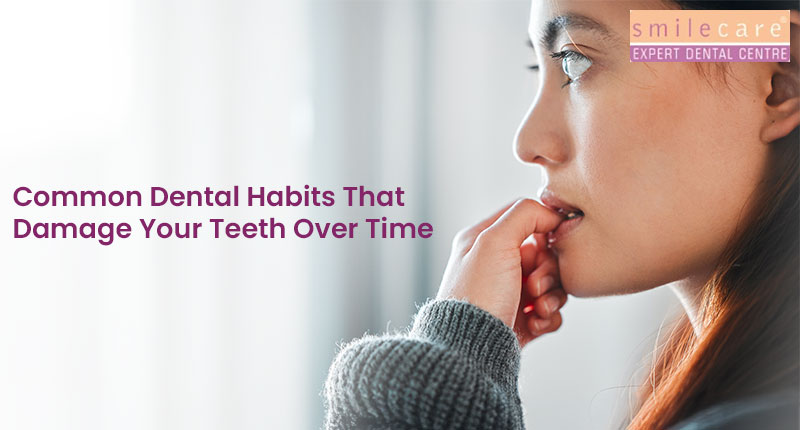Your smile is one of your most valuable assets. However, some dental habits can damage your teeth without you even realizing it. In this article, we’ll dive deep into the most common habits that harm your teeth, explore how to maintain good oral hygiene habits, and understand why regular dental checkups are essential. Whether you’re brushing too hard or skipping flossing, we’ll cover everything you need to know to protect your pearly whites for years to come.
1. Brushing Too Hard
It may seem like brushing harder would clean your teeth better, but this habit can actually do more harm than good. Using excessive force while brushing can wear down enamel, the protective layer of your teeth, and irritate your gums. Over time, this can lead to tooth sensitivity and gum recession.
How to Fix It
- Use a soft-bristled toothbrush.
- Apply gentle pressure while brushing.
- Follow the proper brushing technique: small, circular motions rather than aggressive back-and-forth scrubbing.
2. Skipping Flossing
Many people underestimate the importance of flossing, but it’s a critical part of good oral hygiene habits. Brushing alone cannot reach the spaces between your teeth where food particles and plaque build up. Ignoring flossing can lead to cavities, gum disease, and bad breath.
Quick Tips for Effective Flossing
- Use about 18 inches of floss.
- Wrap it around your fingers and slide it gently between your teeth.
- Avoid snapping the floss to prevent gum damage.
3. Grinding and Clenching Teeth
Teeth grinding (bruxism) and clenching can cause serious damage to your teeth over time. This habit often occurs subconsciously, especially during sleep, and can lead to chipped teeth, jaw pain, and headaches.
What You Can Do
- Wear a custom-fitted mouthguard while sleeping.
- Practice stress management techniques like yoga or meditation.
- Consult with the best dentist in Bandra West for tailored solutions.
4. Using Teeth as Tools
We’ve all been tempted to use our teeth to open packages or cut tape, but this habit is a big no-no. Your teeth are not designed to handle such stress and can easily crack or chip when used as tools.
Better Alternatives
- Keep scissors or a multitool handy.
- Resist the urge to use your teeth for anything other than chewing food.
5. Consuming Too Many Sugary and Acidic Foods
Sugary and acidic foods are major culprits when it comes to tooth decay. Sugar feeds harmful bacteria in your mouth, producing acids that erode enamel. Similarly, acidic foods like citrus fruits and soda can weaken your teeth over time.
How to Protect Your Teeth
- Limit your intake of sugary and acidic foods.
- Rinse your mouth with water after consuming them.
- Use a straw when drinking acidic beverages to minimize contact with your teeth.
6. Skipping Regular Dental Checkups
Many people only visit the dentist when they experience pain or discomfort. However, routine dental checkups are essential for catching problems early and preventing more serious issues down the line. Professional cleanings can also remove dental plaque and tartar that regular brushing cannot.
Benefits of Regular Checkups
- Early detection of cavities and gum disease.
- Professional dental plaque treatments for a healthier mouth.
- Personalized advice from the best dentist in Bandra West.
7. Smoking and Chewing Tobacco
Tobacco use is one of the worst habits for your oral health. It stains your teeth, causes bad breath, and increases your risk of gum disease and oral cancer.
Steps to Quit
- Seek support from friends and family.
- Join a smoking cessation program.
- Replace tobacco with healthier alternatives like sugar-free gum.
8. Chewing on Ice
Chewing on ice might seem harmless, but it can crack your teeth and damage dental restorations like fillings and crowns. The hardness and cold temperature of ice make it especially risky.
Safer Alternatives
- Chew sugar-free gum to satisfy your chewing habit.
- Drink cold beverages without ice to resist temptation.
9. Not Replacing Your Toothbrush
Using an old, worn-out toothbrush is less effective at cleaning your teeth and can harbor bacteria. Dentists recommend replacing your toothbrush every 3-4 months or sooner if the bristles are frayed.
Pro Tip
- Set a reminder on your phone to replace your toothbrush regularly.
- Opt for an electric toothbrush with a built-in timer for better results.
10. Ignoring Signs of Dental Problems
Pain, sensitivity, or bleeding gums are often dismissed as minor issues, but they could be signs of more serious problems. Ignoring these symptoms can lead to complications that require extensive treatment.
When to See a Dentist
- Persistent toothache or sensitivity.
- Bleeding or swollen gums.
- Any changes in your oral health that concern you.
Conclusion
Your teeth deserve the best care you can give them. By avoiding these common dental habits, practicing good oral hygiene habits, and scheduling regular dental checkups, you can maintain a healthy, beautiful smile for life. If you’re dealing with dental issues or need guidance, don’t hesitate to consult the best dentist in Bandra West. Remember, your smile is worth every effort you put into it!
FAQs
1. What are some bad dental habits to avoid?
Brushing too hard, skipping flossing, grinding your teeth, and consuming excessive sugary or acidic foods are all habits that can harm your teeth over time.
2. How often should I visit the dentist?
You should schedule dental checkups every six months for routine cleanings and early detection of potential issues.
3. Can professional dental treatments help with plaque removal?
Yes, professional dental plaque treatments effectively remove plaque and tartar that cannot be eliminated through regular brushing and flossing.
4. Why is flossing important for good oral hygiene?
Flossing removes food particles and plaque from between your teeth, preventing cavities, gum disease, and bad breath.
5. How can I protect my teeth from damage?
Practice good oral hygiene habits, avoid harmful habits like chewing on ice or grinding your teeth, and consult the best dentist in Bandra West for personalized advice.

